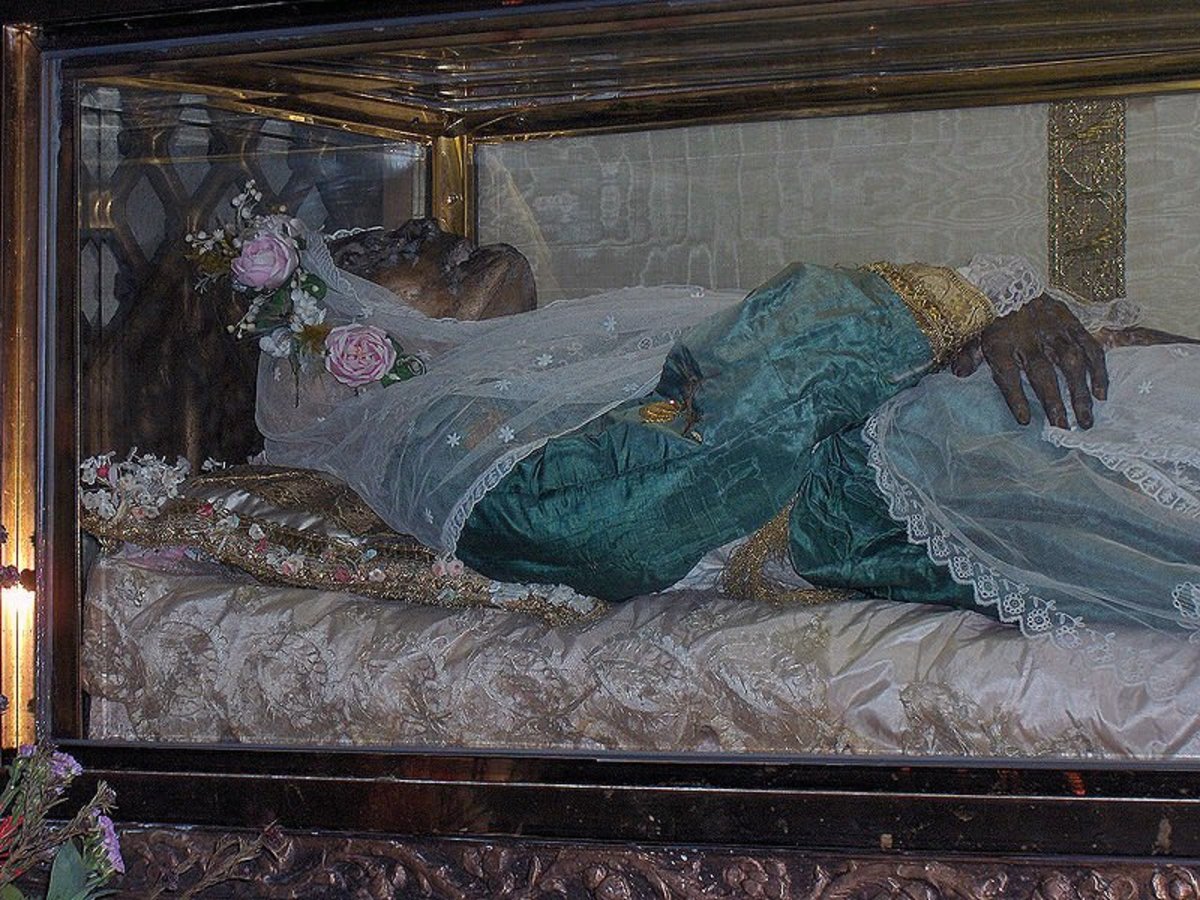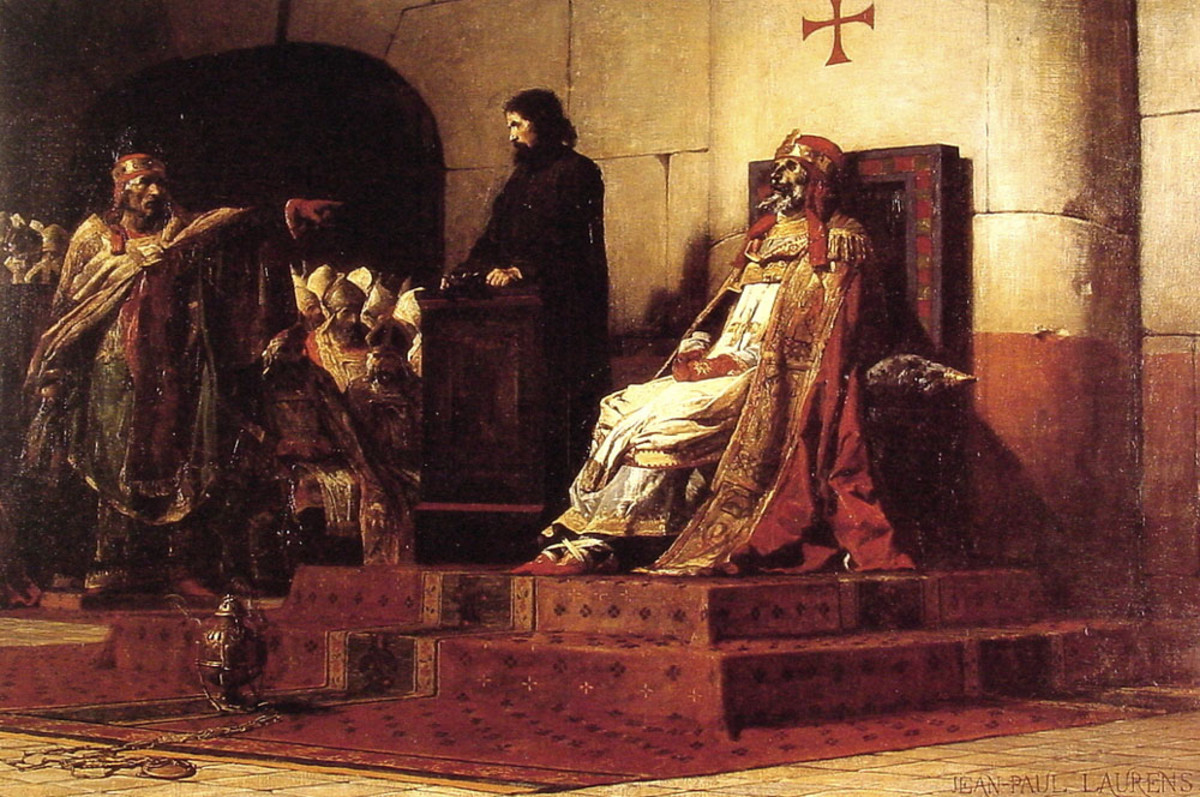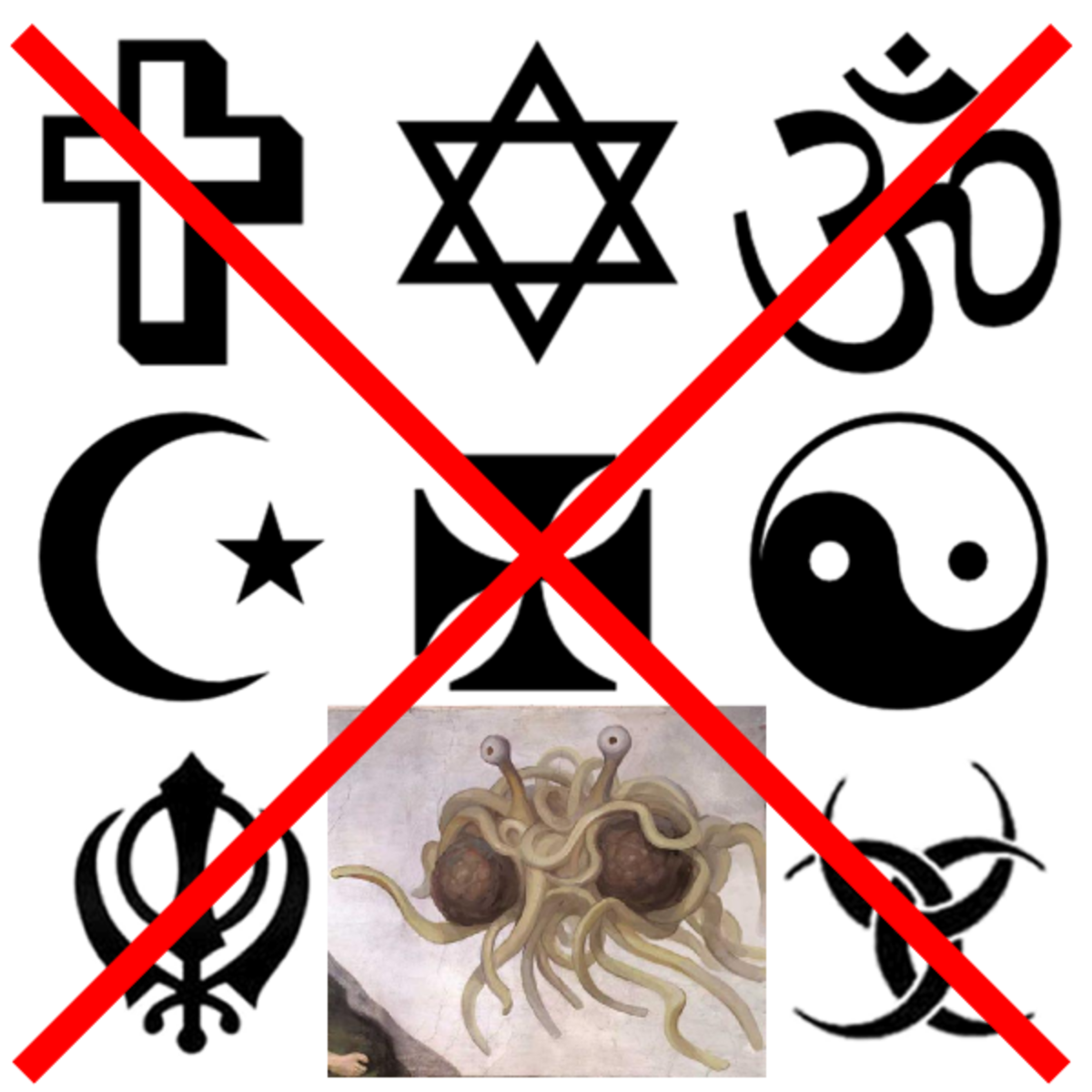Why Do We Still Need Venus?
The Green Man - Enduring Paganism
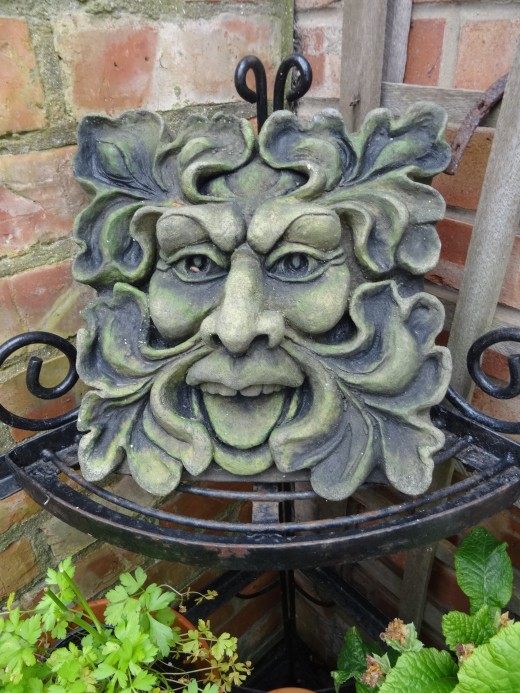
Tannhäuser and Venus - Still Showstoppers
The recently finished Tannhäuser revival at the Deutsche Oper, Berlin, broke all daftness records, but is the production we shall remember. Was it the 40 hospital beds on stage for the exhausted returning pilgrims, or the 20 suits of armour that were raised and lowered randomly, throughout the 3 hours – sometimes replaced with a set of devils? Silly theatre can be so powerful!
During the overture, Tannhäuser, (played by a stunt man) is lowered the 50 feet or so from the top of the stage, waving arms and legs. He takes several minutes to descend into a sea of female flesh, albeit with artificial breasts. I assume, there cannot be a female chorus, so well endowed, with not a wobble in sight. I wondered what the women would do with Tannhäuser’s full suit of armour once he was beneath the sea of limbs. I wasn't disappointed. During the crescendo of brass, bits of armour were thrown up from the depths and then appeared the real, exhausted Tannhäuser, ready for his domestic with Venus.
Why is Venus important to us in 2017, or why was she important in 12th century Christian Germany, or 19th century Paris? Why is she a key figure in Wagner’s opera, Tannhäuser? I believe it is because she is a good vehicle for the artist to express creativity and challenge popular ideas. That is the role of the artist.
Rector Harrington and the Green Man
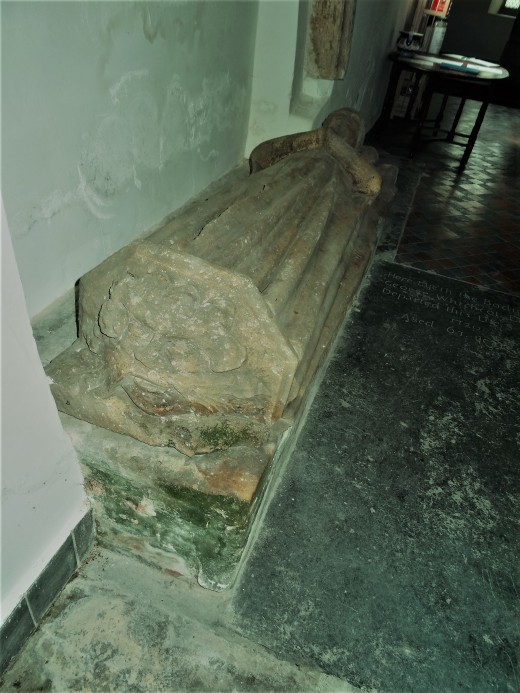
Deutsche Oper Berlin Celebrates Venus
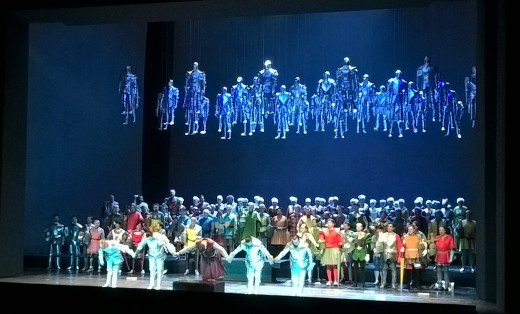
Pagans Helped us to Christianity
We can understand why Wagner uses Venus as a dramatic vehicle, but why does St. Chad’s Church in Harpswell have William Harrington, (rector, died 1350), resting on a superb Green Man? The Cathedral in Würzburg has a Green Man overlooking God. Nicosia churches have multiple Green Men. The 13th century minstrels were fascinated by Venus.
Is there a connection? Is there an explanation?
Waldemar Januszczak has an offering I'd like to test. In his fascinating BBC4 program on the Dark Ages, he pointed out that early portrayals of Christ gave him a feminine, or at least very boyish face. Only later, with the Mary cult well established in Christianity, do Jesus depictions move toward the heroic Jupiter-face. Waldemar explains thus. Early Christianity had an image problem – how to appeal to the 50% of the population, who were women. To get around this, artists often went for an androgynous Jesus. The later, post Mary-Cult version of Jesus with Jupiter’s face, was designed to bring the pagans on board, without detaching them from their old religion.
Once one starts looking, Waldemar's argument stands up in many scenarios.
St. George’s female side is beautifully portrayed in any number of early 15th century sculptures by Bernd Notke. The Katherine Church in Lübeck has plaster copies. One of them cannot be a mistake. George is more feminine than the princess waiting to be saved from the dragon. Is the female George another example of the boyish Jesus?
A Delightfully Boyish Green Man
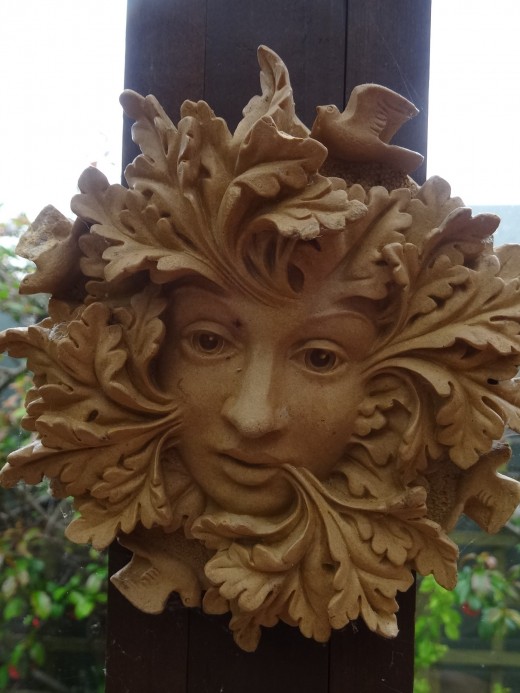
The Original Boy George
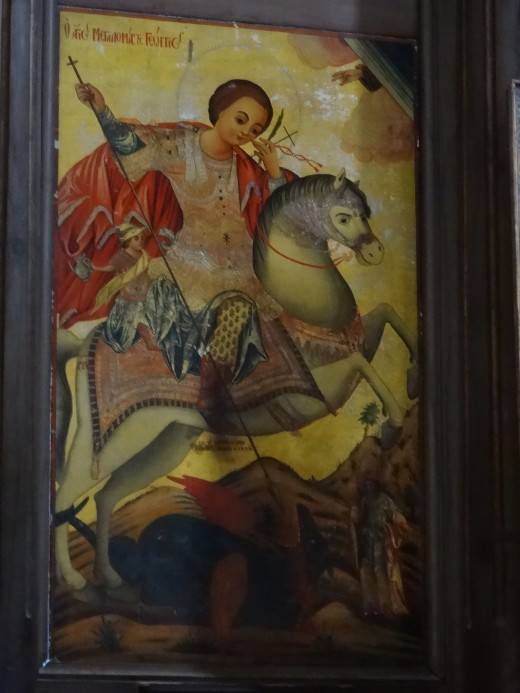
It Didn't Happen in a Day
During early Christianity, there were still pockets of pagan sympathy, and belief in gods such as Venus was a staging post between pagan and full Christian. Venus helped keep new Christians in their old comfort zone. Minstrels and poets used her to express sides of their characters, that were no longer acceptable as medieval Christian dinner talk. Was an androgynous St. George a useful comforter for both genders? Why did Venus reappear so many years after her demise as a Roman goddess?
The theory is, that the middle ages were not as Christian as our history lessons have us believe. For example, the Slav King Jaczo, reigned over the area we now call Berlin Brandenburg. He crossed to Christianity in 1154. That was when, with his horse sinking exhausted into the Havel, he did a few try-out prayers to various deities. Things improved after summoning Christ and his horse was helped to the bank of the river. He decided to become a follower, but did he give up his three-headed pagan god Triglav, immediately? Probably not. We all need islands of safety within our vision, before we can take the leap.
Wagner and Venus
Time to apply Waldemar's theory to Wagner's Tannäuser. Wagner merged two medieval sagas for his opera. That apart, he remained (nearly) faithful to the original yarns.
Venus lived in the Venusberg, somewhere in what is now Thuringia. Tannhäuser told Venus that he wanted to leave her, because he missed the sky and birdsong. The Venusberg was subterranean, in a mountain, rather than on it, and hidden from mortals. Hold that thought. The protruding bone, which supports female pubic hair is called the mons veneris in anatomy – Latin for Mount of Venus. In the saga, men who entered the Venusberg, accepted perdition.
Let’s assume Venus and Tannhäuser were in a vast cavern, waited on by as much voluptuous flesh as a man could want to gaze upon and sample. You can have too much of a good thing - apparently. Tannhäuser, after an hour of operatic wailing, shouting and accusations, leaves Venus, and returns to the Wartburg. This medieval castle is on a mountain in Thuringia, and is where the rest of the operatic action takes place. The hall can still be visited. In the Wartburg, he rediscovers his love for Elizabeth, the symbol of Christian female purity. She is waiting to be taken and dominated by an honourable knight. Tannhäuser, a knight and minstrel, was her big love, before he went sampling without portfolio in the Venusberg.
Tannhäuser gets embroiled in a singing contest on the theme of true love. Elizabeth’s hand is the prize for the winner. Tannhäuser’s friend Wolfram, dutifully sings of pure love – no lust. Tannhäuser blows a gasket and tells them that a bit of lusting after flesh hurt no one. Elizabeth is enthusiastic about the idea. Tannhäuser gets carried away and admits to a sojourn in the Venusberg. He is turned out the castle and told to join pilgrims underway to Rome to see if such a sin can ever be forgiven.
Medieval Pilgrim
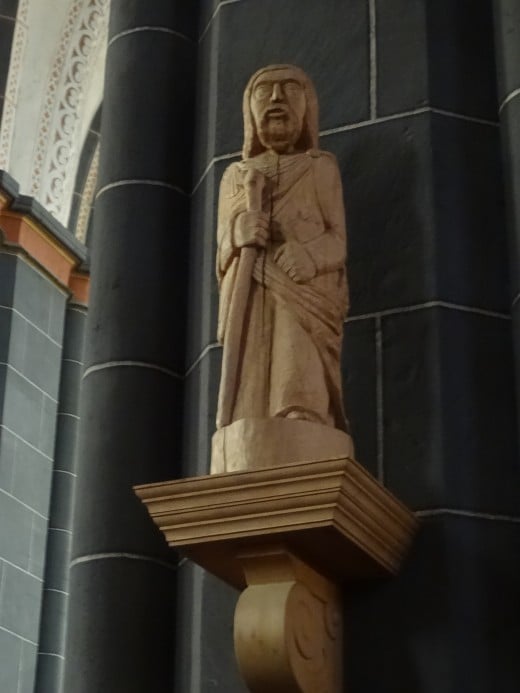
Elizabeth's Libido, in his Dreams
Nowadays the same soprano sings Venus and Elizabeth, in the same costume and make-up. We have to ask - was the Venusberg a figment of Tannhäuser’s erotic fantasy? Did he fantasise about Elizabeth’s female libido? Is Elizabeth ready to show the lustful part of her femininity? Was this a match made in the Venusberg, rather than in heaven? We never find out. Tannhäuser leaves the distraught Elizabeth to wonder what might have been. She agrees that her husband must be presentable and accepts he must go to Rome. She prays for the Pope’s forgiveness.
Stunning Redemption
Tannhäuser returns from Rome and relates Pope Urban IV’s words. He is as likely to be forgiven such a heinous sin, as Urban’s staff is, to sprout leaves. Elizabeth sinks exhausted to the floor. Wolfram covers her with a shroud. Tannhäuser wants to return to the Venusberg, Elizabeth rises from under the shroud. Now she is Venus and tries to seduce him. Wolfram holds Tannhäuser back, and prevents him approaching Venus. Tannhäuser dies, as pilgrims enter to declare the staff has sprouted leaves – Tannhäuser is forgiven and can join Elizabeth in heaven.
Waldemar's History Lessons on YouTube
- The Dark Ages: An Age of Light Trailer - YouTube
Waldemar Januszczak's landmark BBC4 series on the misunderstood Dark Ages is now available on DVD from the ZCZ Films shop: http://www.zczfilms.com/shop/films...
Accepting Sex-Drive
In 19th century Europe, many men believed, if women possessed sex drive, they were whores. No one asked the question, was Tannhäuser without guilt, when Venus and he engaged in so-called, sins of the flesh. Did the staff sprout, because there was no sin to be forgiven? In the medieval version of the saga, Tannhäuser does return to the Venusberg, and the staff still sprouts. Were those poets and minstrels trying to tell us, lustful sex is not a sin? Is this why we still love those ancient stories?
We know what Wagner thought. He celebrated female sex-drive on stage, most notably in Tristan and Isolde, although he did let the love potion take the blame for Isolde’s wanton behaviour. No one is fooled, nowadays. We know Tristan and Isolde have the hots for each other, long before the love potion is administered.
Why did Wagner go for the soft ending in his version of Tannhäuser? These operas divided society. The Paris premier of Tannhäuser, (1861) was a disaster and wrecked by the audience’s protests, because the dance was in the wrong place and disturbed dining habits. Perhaps, with such an audience, the medieval ending was unthinkable. The lovers had to go to heaven, not the Venusberg!
Jean Shinoda Bolen, in her Jungian analysis of the role of Goddeses in our lives, defines Venus as the woman with serious sex-drive. I left my copy of Bolen's 'Goddesses in Everywoman,' in a prominent place in my house. No visitor has managed to pass the book without stopping and having a peek. We all need a bit of pagan!
Venus Goes Other Places
The Tannhäuser story has inspired many works of art, literature and the occasional film (Blade Runner). Aubrey Beardsley added to the genre in the 1890s, with his thin volume, The Story Of Venus And Tannhäuser. It wasn’t printed in full until the 1960s, because no one had the courage. Beardsley died before completion. He describes Tannhäuser’s entry into the Venusberg and the high jinks thereafter. It is pure smut and great fun. Another reason we need Venus – to remind us that life is to be enjoyed and you never know what you might like until you have tried it.
I couldn’t resist Venus and Tannhäuser either. The lovers, in my novel Goddesses, role play Beardsley’s ideas. The complete novel should be a published this year, providing my courage doesn’t desert me.
Venus Forbidden
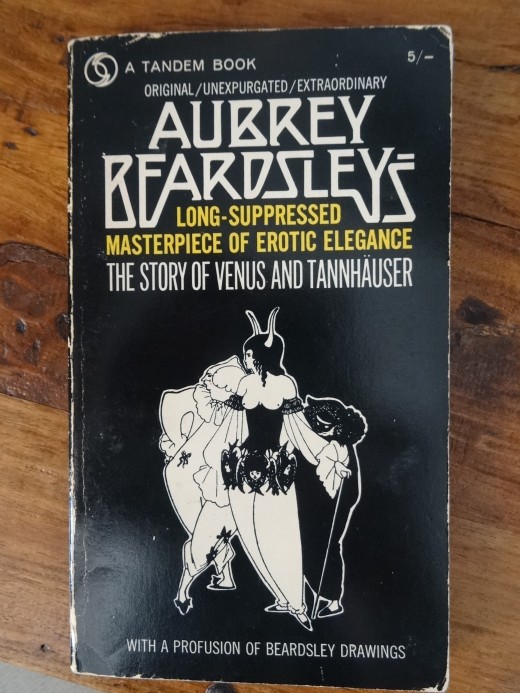
Goddesses set us Free
Gods and Goddesses, are there to let us let our hair down. They allow us to act out a bit of our character, which otherwise, wouldn't find an outlet. They appeal to the non-Christian part of us today, as they did for the early Christians 1000 years ago. Waldemar is right. They let us off the hook, but in so doing, keep us on the hook. Let off steam sometimes, is the message. A little bit of what you like, does you good.
Bolen defines women as character types, by using goddesses. If that sounds trite, read her book.
What About the Green Man?
We all love a mystery and the Green Man remains one. We have no idea of his symbolic meaning in pre-Christian society. Why was he so popular with gothic-church builders? Most mysterious, is his enduring popularity as a garden ornament. What position in our character does he personify? We don't know, but we all like to be a bit mysterious. That is a character trait, too.



